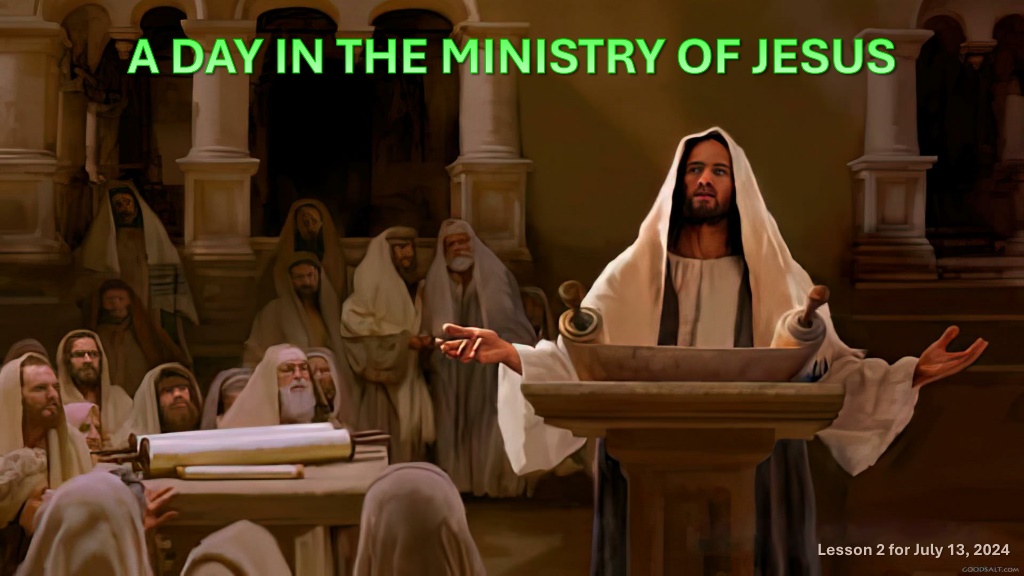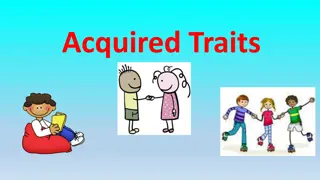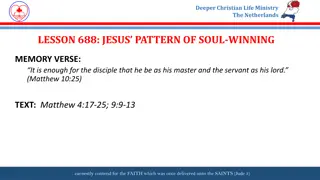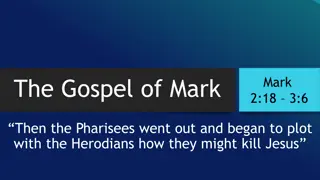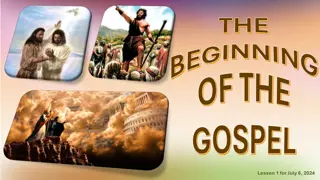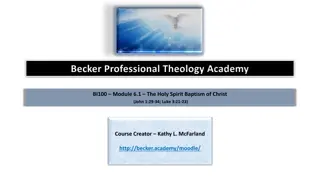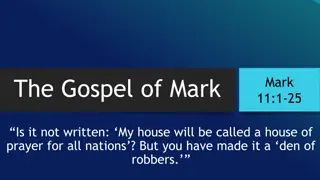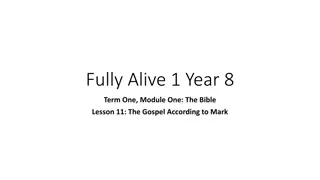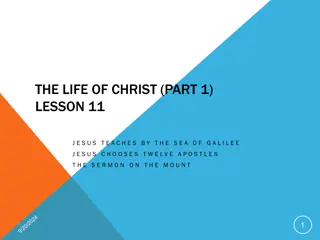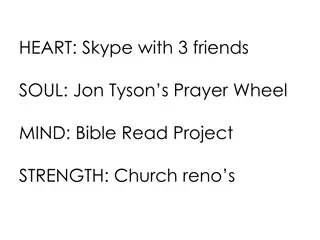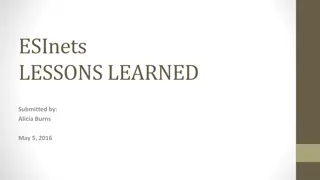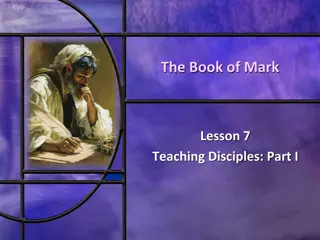A Day in the Ministry of Jesus: Lessons Learned from Mark
Explore a day in the life of Jesus as portrayed in the Gospel of Mark, focusing on his interactions with fishermen, teaching in the synagogue, and demonstrating his healing powers. Witness how his followers left everything to follow him, experience the impact of his teachings, and witness miraculous healings that inspire service and sharing of blessings.
Download Presentation

Please find below an Image/Link to download the presentation.
The content on the website is provided AS IS for your information and personal use only. It may not be sold, licensed, or shared on other websites without obtaining consent from the author. Download presentation by click this link. If you encounter any issues during the download, it is possible that the publisher has removed the file from their server.
E N D
Presentation Transcript
A DAY IN THE MINISTRY OF JESUS Lesson 2 for July 13, 2024
What would a day in the life of Jesus be like? What if we accompanied him for a full week? Mark helps us live this experience in the last part of his first chapter (Mark 1:16-45). We will accompany Jesus by calling a group of fishermen to follow him full time; enjoying a busy Sabbath day; and, finally, we will see what their daily customs were.
Come, follow me, Jesus said, and I will send you out to fish for people. (Mark 1:17) Mark is characterized by his brevity. If we did not consult the other gospels, we might reach erroneous conclusions about this calling. This was not the first time these men had encountered Jesus. As followers of John the Baptist, they had heard his words about Jesus, and they had followed him. The first to do so were Andrew and John, followed by their respective brothers (Jn. 1:35-42). Jesus preaches from Peter's boat, and then a miraculous catch takes place. The four brothers' nets were almost torn by the number of fish (Luke 5 :1-7). While James and John mend the nets, Peter falls at Jesus' feet (Luke 5:8-11). Jacob and John left their father in charge of the family business, and Peter and Andrew left their livelihood to be soul winners. By obeying the call of Jesus, they changed their lives, and the lives of the entire world.
They went to Capernaum, and when the Sabbath came, Jesus went into the synagogue and began to teach (Mark 1:21). The gospels make it clear that going to the synagogue on Sabbath was a custom of Jesus, not an isolated event (Luke 4:16). How did people react to Jesus' preaching? (Mark 1:22). But not everyone was happy. The enemy decided to interrupt the service, hoping to nullify Jesus' influence (Mark 1:23-26). A quick intervention caused the people to be even more influenced by Him (Mark 1:27-28). Three facts stand out from this story: 1. There was a demon in the church. There are tares in the church, and we cannot distinguish them (Mt. 13:24-30). 2. The demon knew who Jesus was, and looked for a way to neutralize His influence. 3. Jesus ordered him to be silent. It was not the time to openly declare himself as the Messiah.
HEAL That evening after sunset the people brought to Jesus all the sick and demon-possessed (Mark 1:32) At the end of the service in the synagogue, Jesus retired with his four disciples to Peter's house to enjoy a meal in privacy (Mark 1:29). While they were preparing the table, they told Jesus about Peter's mother- in-law, attacked by fever (Mark 1:30). Once healed, this woman dedicated herself to serving the guests (Mark 1:31). The benefits that Jesus imparts to us provoke in us the desire to share them with others. The miracle of the demon possessed was the topic of conversation in many homes in Capernaum. So, at the end of the sacred hours of the Sabbath, when the sun had set, they brought many sick people to Jesus to be healed (Mark 1:32-34). What a joy! What cries of praise resounded in Simon's house! And not only did the healed praise, Jesus himself rejoiced in bringing them healing. After an exhausting day, late into the night, Jesus was finally able to rest.
PRAY AND PREACH On Sunday, the disciples waited for Jesus to preach in the city. But Jesus' plans were different. He was to benefit many others with his words and actions (Mark 1:36-39). But Jesus was not acting on his own initiative. As usual, he had gone first to talk to his Father so that he could tell him what he had to do that day (Mk. 1:35; Jn. 8:28 ). Every day Jesus used to seek God in prayer, and he invites us to imitate him (Mark 6:46; Luke 3:21; 5:16; 9:18; 11:1; 18:1). In special situations, he even dedicated entire nights to prayer (Lk . 6:12-13; Mt. 14:21-23). Should we not, like Jesus, seek God every day in prayer to know his will? In special situations, won't we seek Him especially in prayer?
HEAL AND RESPECT THE LAW The leper, isolated from all human contact due to his illness, knelt before Jesus begging for healing (Lev. 13:45; Mark 1:40). In front of the crowd, Jesus does something contrary to the law: he touches the leper and therefore becomes unclean. But, instead of receiving the leper's uncleanness, the leper received Jesus' healing. As we come to Jesus with our sins and filth, He will not depart from us. He will give us forgiveness and healing, making us clean like Him. He showed his respect for the law Show yourself to the priests After healing him, he gave two orders with a double purpose (Mk. 1:44) It gave the priests the opportunity to accept him as the Messiah. He prevented the priests from being predisposed against the leper To silence He avoided arousing messianic expectation in the crowds
The Saviours life on earth was not an easy one. But He never grew tired of working to save lost people. He lived an unselfish life from His birth until His death. He did not try to be free from hard work and tiring journeys. He said that the Son of man did not come to be served, but to serve and to give his life to redeem many people. Matthew 20:28. This was the one great aim of His life. Everything else was less important. To do God s will and to finish His work was like food and drink to Him. There was no thought of self in His work." EGW (Steps to Christ, pg. 77)
